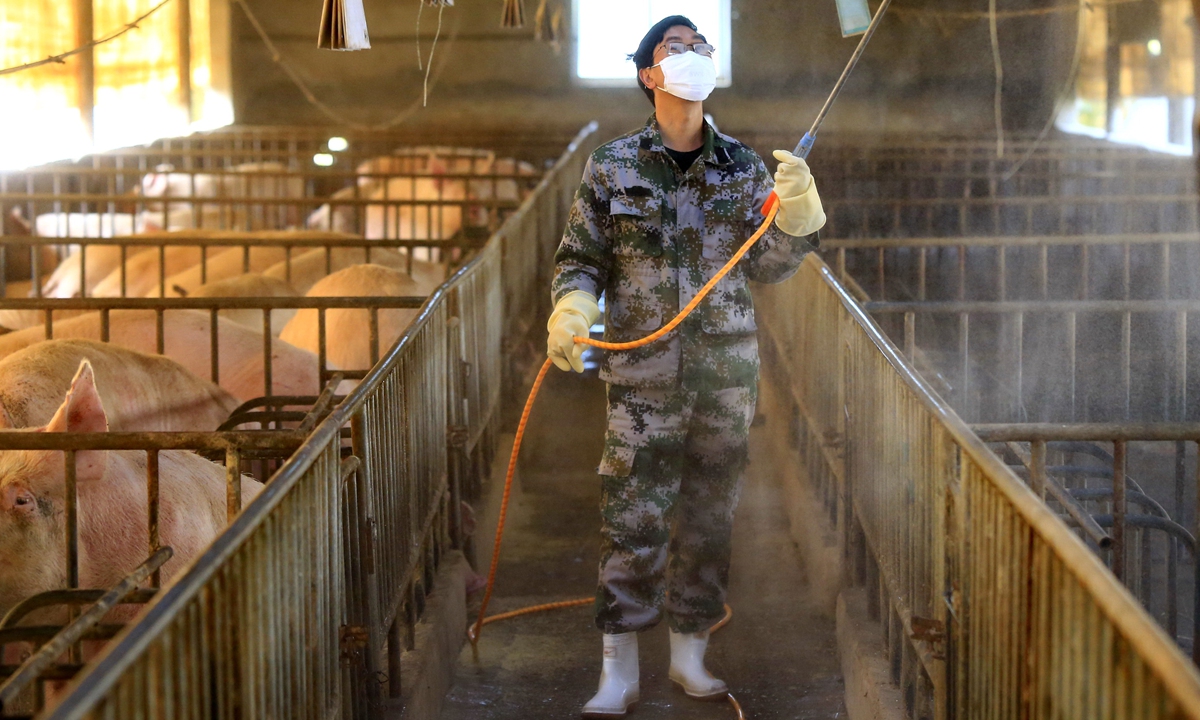US breeding pigs land in Sichuan, part of move to improve domestic livestock
Breeding pigs dubbed 'pig chips' due to connection to safety of supply

An employee is disinfecting the pigpen. Photo: cnsphoto
A total of 985 breeding pigs from the US arrived in Chengdu, capital of Southwest China's Sichuan Province in a chartered plane, providing a source for China's domestic stock breeding.This is the first batch of a mass import order of 2,400 breeding pigs from the US by a livestock breeding company in Sichuan that's a unit of China's agribusiness giant Zhengbang Group, a record high import volume for the province, the company told the Global Times on Monday.
The second batch of imports is scheduled to arrive on Friday.
The pigs will undergo a 45-day quarantine period before they are put into production, Zhou Houqin, an administrative staffer at the local importer told the Global Times.
These 2,400 animals are projected to produce another 20,000 breeding pigs and 650,000 commercial pigs annually, which will contribute to the stabilization of the pork market in Sichuan.
China imported more than 30,000 breeding pigs last year, a record high, with Southwest China's Yunnan Province having the most imports - more than 8,000 animals.
Denmark, the US, Canada and the UK are major import sources for China's breeding pigs.
Wang Zuli, deputy researcher at the Institute of Agricultural Economics and Development at the Chinese Academy of Agricultural Sciences, told the Global Times on Monday that China has been relying on imported breeding pigs for years because of the heavy investment, long cycle and slow improvement in efficiency involved.
"It usually takes five to six years to complete the breeding cycle on our own," said Wang, adding that such pig imports will be fewer this year than in 2020.
China has lately underscored improving the quality of domestic breeding stock - including livestock and poultry - to meet agricultural development demand, since seed quality is of great importance to the country's national security, food security, economic security and social security.
There are 90 local pig breeds in China, including 42 national-level protected ones and 32 provincial-level protected ones. On the endangered breed list of local livestock and poultry genetic resources, eight breeds have become extinct and 25 species are endangered, according to the Ministry of Agriculture and Rural Affairs.
Breeding pigs are vividly dubbed "pig chips" because of their connection to the safety of the supply of commercial pigs, just as semiconductors are to technology, amid the nation's aim to grasp core technologies instead of being exposed to the risks of being hit by others, some industry observers have suggested.
Qin Yinglin, a national lawmaker and chairman of Muyuan Foods, one of China's largest hog producers, suggested during this year's two sessions that top companies in the industry should play a leading role, increase the rate of core species origins, and include research on the disease resistance of pigs and genetic mechanisms in the national special plan.
China has promoted independent innovation to ensure its livestock and poultry breeding resources, with the self-sufficiency ratio of key livestock and poultry breeds exceeding 75 percent, said Qin Yuchang, director of the Institute of Animal Science under the Chinese Academy of Agricultural Sciences, at a press conference in January.
Meanwhile, Chinese authorities have taken strict measures to prevent the risks posed by African swine fever. In the latest move, Sichuan, the biggest producer of pork, issued a ban on the transportation of live pigs from out of the province through illegal channels and vowed to severely punish those who violate the rules, according to news reports on Sunday.
Last week, China banned all imports of pigs, boars and related products from Malaysia after it detected its first African swine fever outbreaks last month.

